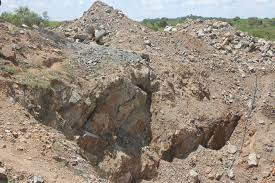
ZIMBABWE’S environmental management watchdog said this week it was mulling a crackdown on big mining companies that have abandoned unrehabilitated chrome pits in the country’s Great Dyke mineral belt.
The Environment Management Agency (Ema) said swathes of northern Great Dyke had been excavated by chrome hunters and left open, putting animals and humans in grave danger along the 550-kilometre mineral belt that also contains platinum, gold among other minerals.
But informal miners told the Zimbabwe Independent during a tour of the areas last month that they were not alone.
They said big miners, or their representatives, were also roaming the Great Dyke, including invading open cast chrome shafts left by other miners before.
The rush for Zimbabwe’s chrome has been triggered by an explosion of demand in emerging economies, mostly in Asia.
Midlands, Darwendale and Rosva areas, which also lie within the Great Dyke, are among the worst affected.
Areas bearing the worst scars include a Cold Storage Company (CSC) farm in Darwendale where artisanal miners roam freely without regulation.
At claims on the farm controlled by one leading Chinese firm, artisanal miners said the miner has not been on site for years.
- Boustead Beef seeks to end CSC corporate rescue
- Boustead Beef seeks to end CSC corporate rescue
- Let the music play at JamAfro Festival
- British investor makes new claim over CSC . . . Boustead says it took over full control of the beef processor in 2019
Keep Reading
Responding to inquiries by the Independent, Ema provincial manager for Mashonaland West Rambwayi Mapako said rehabilitating exhausted claims was at the heart of the agency’s strategy.
“Land degradation has become one of the greatest issues over the past years, especially along the Great Dyke range because it is a huge mineral reserve,” Mapako told the Independent.
“Although all mining companies are subjected to the environmental impact assessment (EIA) process, not all of them have been seeing this through.
“This has resulted in the majority of land being left un-rehabilitated. Some major players implicated in land degradation, especially along the Great Dyke, are Afrochine, Zimasco and ZimAlloys. Their operations are under monitoring by Ema and they are subject to prosecutions and environmental protection orders,” Mapako said.
However, he noted that nailing transgressors has been difficult as many were informal players without records or known addresses.
“Most abandoned chrome sites are a result of illegal mining activities and accountability has been difficult,” he said.
“Illegal chrome miners operate as syndicates and cohorts with buyers. These illegal chrome mining activities along the Great Dyke have resulted in rampant land degradation.”
To tackle the crisis, Ema was working with the Ministry of Mines and Mining Development and the Zimbabwe Republic Police, he noted.
“As a mitigation measure, we are in the process of identifying and engaging claim holders to rehabilitate their claims while instituting preventative measures to curb illegal chrome miners’ activities,” Mapako told the Independent.
According to Ema, every firm exploiting minerals must have an EIA certificate. The document helps authorities to hold them accountable.
“Procedurally mining is a prescribed activity in terms of Section 97 of the Environmental Management Act Cap 20:27. The process requires the commissioning of an EIA report, which must be submitted to the agency for approval before commencement of any works,” Mapako said.
In an interview with the Independent, Zimbabwe, Zimbabwe Environmental Law Association (Zela) legal officer Effort Dube said mining companies were required to have an EIA certificate.
“If they have the EIA certificate, there is a need to approach the Environment Management Agency (Ema) offices… because according to the law they are supposed to rehabilitate the land,” Dube said.
In several interviews, small scale miners told the Independent recently that environmental protection was not their immediate concern.
“We rarely think of the impact of our activities on the environment or the dam because we are looking at the little that we can get from honest work,” Brian Nhunhama, an artisanal miner said.
His colleague, Brian Musiyamhanje, said they only moved on open pits that had already been left behind by big miners.
He wants authorities to demand that big miners act to reclaim the open pits.
“Instead of targeting us, authorities should approach mining companies that used to mine here to find ways to restore the land,” Musiyamhanje said.







